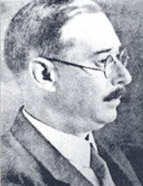

In the ancient disagreement that seems to preside over the history of philosophy itself, he embraces the clear eidetic and Platonic construction of Knowledge, which neo-Kantism best reveals. Philosophising, far from the logical-scholastic formalism of the Organon , ‘unfruitful’ thought, is ars inveniendi driven by the ‘imperious desire to discover something new’ ( OC , I, p.11). It is not only science that seeks to find; nor is it only experience that finds. In fact, not inferring the foundation of the sciences from Philosophy, the ‘science of first principles’ in Aristotle ’ s words, hostage to argumentative logic and servant to its language, JC postulated a different relationship between Philosophy and Science that ‘could not be subject to the imperatives of a vertical rationality but should be based on a permanent epistemological reflection that respects the autonomy (I do not say independence) of both forms of knowledge ’ ( ‘ Joaquim de Carvalho e a Históri a’ [Joaquim de Carvalho and History] , Homenagem ao Doutor Joaquim de Carvalho no 1.º Centenário do seu nascimento [Tribute to Doctor Joaquim de Carvalho on the 1 st centenary of his birth] , Boletim da Biblioteca da Universidade de Coimbra [Bulletin of the Library of the University of Coimbra] , 42.º, 1994, p. 10).
Studies in the History of Sciences, driven by the neo-Kantian schools of German objective idealism, in the tradition of the ‘sciences of the spirit’ and the Historiography of the ‘sciences of culture’ (Windelband, Lask, Rickert, Dilthey), challenged the common idea that sciences originated in Philosophy , but they were rooted in protest against their totalising annexation. That is why Philosophy, in its critical and reflective matrix, in the speculative sense of meta-physics (a term that, against Kant, he reintroduced into the idealist glossary), was not limited to discussing the results of Sciences, as positivism and scientism, at the end of the 19 th century, demanded, nor was it chosen as a general encyclopaedia or theory of knowledge. Philosophy itself generates autonomous meanings about the discourses of physis . JC turns to Spinoza to understand how natura naturata , the concretisation of the more geometric ordering ideal of a system clarifies but does not solve the philosophical creation inscribed in the flow of life, natura naturans ( OC , I, p.358 ), aspiring (quite clearly in the Antheriana ) to a Leibnizian cosmic harmony, as the supreme virtu or metaphysical ‘truth’ ( Idem , III, p.349), not as the pacifying term of a physical-mathematical equation or the telos of an omniscient evolution. He thought it possible to inscribe two great philosophical traditions, going from Cartesian Reason (not Cartesian mechanicism, amplified in the scientism of the 19 th and 20 th centuries) mediated by Kant ’ s criticalism (with the apodictic rationalism expunged by Höffding and Max Scheler, postulating the variability of reason, Idem , V, p . 306): ‘at all times, philosophy, which is not mere poetic intuition, has relied on science, but has always tended to evade its boundaries in order to surprise essences’; hence , ‘ unlike science, whose ideal is cold impersonality, philosophy is always a personal conquest or a conscious or reflected adherence ’ ( Idem , I, p. 356).
This work is financed by national funds through FCT - Foundation for Science and Technology, I.P, in the scope of the projects UIDB/04311/2020 and UIDP/04311/2020.
